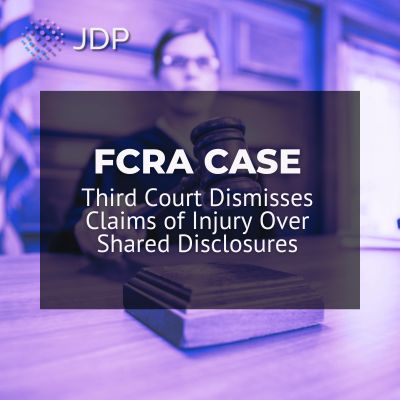Feb 28, 2024
The U.S. Court of Appeals for the Third Circuit announced its findings for a case concerning Article III. According to the case, a company allegedly disclosed an individual’s personal information to an intermediary without proper authorization.
According to the plaintiff, the issue began when they received a letter from the defendant. The defendant attempted to collect upon an outstanding debt for medical services through this letter. Though from the defendant, a third-party service printed and mailed the letter. The defendant provided the third-party mailing with the plaintiff’s name, address, and other personal information. According to the plaintiff, she did not consent to the defendant sharing her information. As such, she claimed the defendant violated the Fair Credit Reporting Act (FCRA).
The plaintiff filed a class action complaint against the defendant in response to this alleged FCRA violation. She filed for herself and other Pennsylvania residents who received collection notices from the defendant through third-party mailing vendors. The plaintiff claimed she suffered stress and embarrassment, and the disclosures invaded her privacy and inflicted reputational harm.
However, the appeals court claimed this activity failed to establish Article III standing. As such, the Court has dismissed the case.
The defendant moved for dismissal for failure to state a claim with the district court. However, the Supreme Court did not consider this argument. The Supreme Court determined it lacked jurisdiction due to the finding that the plaintiff had failed to state a claim. The plaintiff appealed this decision, claiming she suffered concrete injury from the defendant disclosing her information to the vendor. The Court disagreed.
The Third Circuit’s ruling drew inspiration from the Supreme Court ruling in a 2020 case. In this case, the plaintiff sought relief for intangible harms resulting from statutory violations. The Court found “that intangible harms can give rise to concrete injuries when they bear a close relationship to harms traditionally recognized as providing a basis for lawsuits in American courts.” However, the Third Circuit declared that the injury allegedly suffered by the plaintiff “is not remotely analogous to the harm caused by the tortious public dissemination of sensitive facts about another’s private life.” explained how the two did not equate.
Information shared between private intermediary parties without a likelihood of external dissemination cannot compare to a traditionally recognized harm that depends on the humiliation of public disclosure. As a result, the appellate Court upheld the district court’s ruling to dismiss the case.
Disclaimer:
Information provided here is for educational and informational purposes only and should not constitute as legal advice. We recommend you contact your own legal counsel for any questions regarding your specific practices and compliance with applicable laws.
